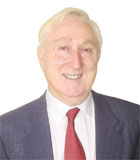![]()
Gear Up | Winning Words
Broaden Your Network | Learners' Light | Enrich Your Readings
On Education
On Education - Interviews with professors and department heads cover the hottest courses available at the eight higher education institutions and the resulting career opportunities.
|
A leader or a follower...
By Ben O'Rourke
Once upon a time, a BA English student graduated from the Chinese University of Hong Kong (CUHK) and embarked on a postgraduate course in applied linguistics at Oxford University. He then returned to Hong Kong where, still jetlagged, he was snapped up by a merchant bank - despite his lack of financial or business skills. Although an inherent belief exists among Hong Kongers that you absolutely must have an MBA to be a banker, these are not unusual circumstances. Indeed, there is a trend among more discerning employers in certain industries to veto candidates with narrow vocational skills and opt instead to recruit people who can think for and express themselves and, if needs be, provide on-the-job training to fill any knowledge gaps . Professor David Parker, professor and chair, Department of English, CUHK, believes this recruitment strategy echoes a shift in the way companies are restructuring and redefining themselves, which in turn requires a versatile workforce adept at changing. One factor that he says will remain the same is that "an education in humanities will always be relevant and always be needed". But how can a humanities degree prepare students to accommodate this change and develop their creative thinking? Prof Parker says a degree in English endows a student with a valuable international currency and a "broader view of the way things are" that very few other courses can offer. "[To] fully engage in language, you must also embrace history, politics, psychology, ethics ..." The list goes on but the heart of the requirement at CUHK is that students think for themselves, "logically, analytically and creatively," he says. "Students need to develop sharp analytical skills to grasp the subtle rhetoric of Shakespeare, for example." Some students may be concerned about the career prospects for English majors. Obviously, many graduates embark on teaching at primary and secondary levels - the most popular career path. This is followed by advertising and marketing, mass communications and publishing. The remainder are scattered throughout social and public service organisations and the government. Overall, there are few industries that do not offer a future for an English graduate. The English major is a three-year programme. The first year consists of communicative skills, linguistics and literature and is dedicated to strengthening spoken and written English through the exploration of the language in various texts and contexts, particularly social and rhetorical ones. Students study key English literary texts and background ideas of Western culture, which form the basis of a comparative study of Western and Chinese literature. The remaining two years allow the students to develop a comprehension of the various forms taken by English literature, from the Renaissance to the present day. Optional course content is extremely varied - children's literature, creative writing, drama, short film production and poetry courses are available. At CUHK, there is an emphasis on role-playing, which develops the flexibility to think from different points of view and "transcend monocultural existence", resulting in open-mindedness and an ability to "think outside the frame". Linguistics - the scientific study of language - develops awareness of what language is, how it is structured and how it relates to the mind and society. In the study of language, linguistic concepts are applied to a student's own language experience, with an emphasis on the ability to analyse literary and non-literary texts. When asking yourself whether or not English is the right path for you, view it as a degree that hurdles the traditional boundaries and limitations that apply to other subjects and consider yourself a world-class graduate. Prof Parker says that, if there is one reason why a student should choose English, it is because "the top people in Hong Kong are always going to need to be as bilingual and multicultural as possible ... Leaders in Hong Kong society need these qualifications and qualities". So, do you want to be a leader or a follower?
Taken from Career Times 2003/07/11 |
|||||||
(11-20 of 68)
A booming market
(2003/07/25)
A leader or a follower...
(2003/07/11)
A classical education
(2003/06/27)
Training for an engineered world
(2003/06/13)
In the market for professionalism
(2003/05/30)
A broader outlook on business
(2003/05/16)
Building a career from the ground up
(2003/04/11)
No ordinary language school
(2003/04/04)
The business of learning
(2003/03/28)
Using geography to understand the world
(2003/03/14)
(11-20 of 68)


